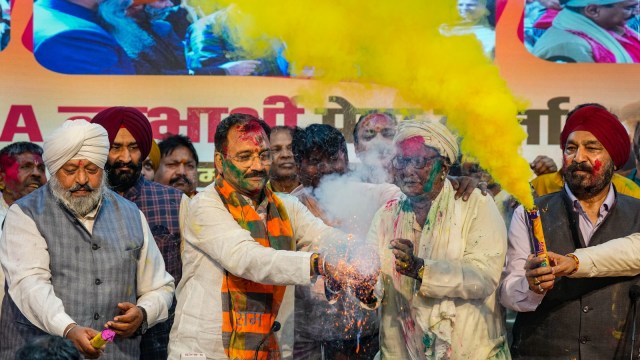CAA ray of hope for us, say Pakistani Hindu refugees in Delhi
They claim they have been living in semi-kutcha houses, cooking in mud and brick stoves, and using tents for defecation in Majnu-Ka-Tilla area ever since they moved to India.
 New Delhi: Delhi BJP Chief Virendra Sachdeva with Hindu and Sikh migrants celebrate after the Centre notified rules for implementation of the Citizenship (Amendment) Act, 2019, in New Delhi, Tuesday, March 12, 2024. (PTI Photo/Vijay Verma)(PTI03_12_2024_000190B)
New Delhi: Delhi BJP Chief Virendra Sachdeva with Hindu and Sikh migrants celebrate after the Centre notified rules for implementation of the Citizenship (Amendment) Act, 2019, in New Delhi, Tuesday, March 12, 2024. (PTI Photo/Vijay Verma)(PTI03_12_2024_000190B)Pakistani Hindu refugees residing in Delhi say they can finally look forward to a secure future as the government notified rules for implementation of the CAA.
They claim they have been living in semi-kutcha houses, cooking in mud and brick stoves, and using tents for defecation in Majnu-Ka-Tilla area ever since they moved to India.
“I moved to India from Pakistan in 2011 and since then, we have not got even the basic facilities here, be it water, electricity or cooking gas,” voice of the Pakistani Hindu refugee community in Majnu-Ka-Tilla, Dharamveer Solanki, told PTI.
“We are now getting water supply but there was a time when people had no access to water in this camp for at least four years. The refugees used to walk to the nearby areas to fetch water,” Solanki said.
“However, we are hopeful now that all our problems will be resolved and getting citizenship is the first step,” he added.
The Centre on Monday implemented the Citizenship (Amendment) Act, 2019, notifying the rules four years after the law was passed by Parliament to fast-track citizenship for undocumented non-Muslim migrants from Pakistan,
Bangladesh and Afghanistan who came to India before December 31, 2014.
Recalling the hardships they faced in the last 13 years after moving to India, Pakistani Hindu refugee Sona Das said most people in their camp have been using mud and brick stoves for cooking purposes.
“While some can afford mini LPG cylinders, most of them use mud and brick stoves for cooking. Even those who have cooking gas at home, they never use it everyday,” Das told PTI.
“Now that the government made the announcement about CAA implementation, we are happy and hopeful,” he added.
With the unveiling of the rules, the Modi government will now start granting Indian nationality to persecuted non-Muslim migrants — Hindus, Sikhs, Jains, Buddhists, Parsis and Christians — from the three countries. The rules comes into force with immediate effect.
Another Pakistani Hindu refugee Kanhaiya said the refugees living in the camp at Majnu-Ka-Tila have been paying Rs 7 per unit for electricity and most people there cannot afford it.
“We barely earn a few thousand rupees to run the family. We live in kutcha and semi-kutcha houses. How can people like us afford such costly electricity,” he asked.
Kanhaiya further said a public toilet was built earlier for the community members, but wasn’t maintained and hence, became unusable later.
“Government’s announcement about CAA implementation seems like light at the end of a tunnel. We hope we get to see the good days soon,” he said.
The CAA was passed in December 2019 and subsequently got the president’s assent but there were protests in several parts of the country against it.
The law could not come into effect as rules had not been notified till now.







